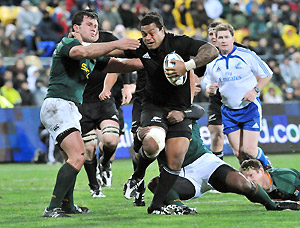
There were a number of intriguing questions answered – and one unanswered – at the end of the titanic All Blacks-Springboks Test, the opening match of the 2008 Tri-Nations tournament, won in the rain and cold of Wellington by the home side, 19 – 8.
Inky: Fit for the fire
Would the All Blacks maintain their decade-long series of victories over the Springboks in New Zealand? Yes.
Would the sequence of 29 successive home Test victories in New Zealand remain in place? Yes.
The All Blacks have now played an astonishing 2400 minutes of Test rugby in New Zealand without a loss. Are the All Blacks back from the horrors of the 2007 RWC? Yes.
In my preview of the Test, I suggested that the All Blacks must be closer to the end of this amazing run of home victories than to the beginning of the sequence. But it was clear on Saturday night that it is going to be a very good team that will end the sequence.
Luckily for the Wallabies, they play only one of their four Bledisloe Cup Tests (two in Australia, one in Hong Kong as well) in New Zealand.
Are the 2008 Springboks going to be that team in Dunedin on Saturday?
Coach Peter de Villiers will have to rejig his pack, probably to bring in Pierre Spies and Ryan Kankowski.
Juan Smith and Joe van Niekerk were barely seen throughout the Test.
Schalke Burger played a mighty game heading the tackle count for both teams with 17 hits. The next highest tackle count, for both sides, was Victor Matfield with 14 tackles.
But Burger was virtually forced to try and combat the impressive New Zealand loose forward trio (even though Richie McCaw was out) by himself.
The New Zealand tight and loose forwards had such a strangle hold on possession that the South Africans were forced to make 164 tackles. New Zealand had to make 126 tackles. Both sides conceded 29 turnovers.
The Springboks took in their Rugby World Cup game plan of playing without risks and capitalising on interceptions and unexpected break-outs for occasional tries into the Test.
Unfortunately for them, and due to another selecting mistake by de Villiers, the third leg of the plan, dead-eyed goal-kicking, was missing.
Butch James missed a couple of shots that Percy Montgomery would have slotted and the All Blacks had a narrow 9 – 8 lead at half-time (after a brilliant try by Bryan Habana) which should really have been a Springboks lead.
After half-time, the fitter, faster and more enterprising All Blacks scored ten points to nil, and they were robbed of a try (apparently by a ruling from the assistant referee) when Jerome Kaino was deemed offside when he clearly was on-side chasing through a Daniel Carter grubber kick.
The Springboks, sooner or later, will have to play more rugby in these big matches if they want to win away from home.
Their lineout remains impregnable, with Victor Matfield in majestic lineout form. And towards the end of the Test, they started unravelling the New Zealand system and won three New Zealand throws in succession.
The Springboks scrum, though, was under pressure.
Of ten Springbok feeds, there were three resets and a lost scrum. There was little attempt to play sequences of play by moving the ball through the backline.
And the All Blacks?
The pack was strong in its set pieces, especially the scrums.
With Daniel Carter in majestic form, the backline looks dangerous whenever they run the ball. Ma’a Nonu made several damaging breaks, and Conrad Smith is a clever defender and organiser in the middle of the field.
Without McCaw this is not a great All Blacks side. But it is a very, very strong team with a lot of character, an area that was missing last year.
The fitness of the All Blacks, too, is going to put opposition teams under pressure (as the Crusaders do) in the second halves of tight matches. There is a lot more action with the ball in play under the experimental law variations (the ELVs).
My feeling is that the Springboks are not anywhere near the fitness levels needed to play effectively for 80 minutes under the ELVs. The Wallabies, in my opinion, have even less 80 minute ELVs fitness than the Springboks.
Three teams that have won the RWC – the 1987 All Blacks, the 1991 and 1999 Wallabies – dominated the rugby world for a couple of years after their World Cup triumph.
Two teams – the 1995 Springboks and the 2003 England – dropped down the ladder in the years after their World Cup victory.
So the last of the intriguing questions arising out of the first 2008 Tri-Nations Test arises: will the World Cup champion Springboks fall back into the pack, or will they remain the rugby pack leader?
The question wasn’t answered on Saturday night.
These are early days. The 2008 Springboks won their home Tests with a degree of panache.
They have lost the first Tri-Nations Test, against an implacable opponent, more easily than the scoreboard suggests. But there was enough in their efforts to suggest that the history of the 1995 World Champions might not be repeated.
At worst, the Springboks are going to be extremely difficult to defeat in South Africa.





























































































